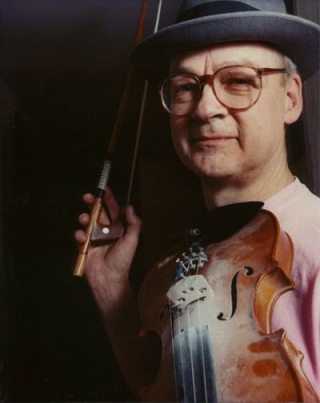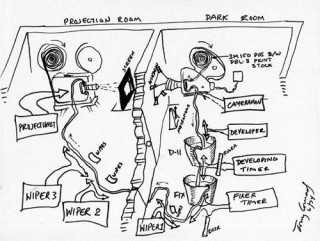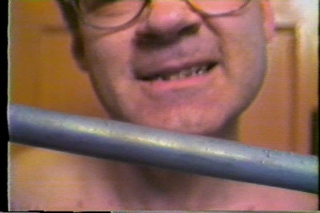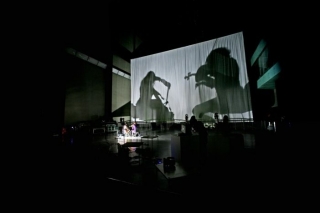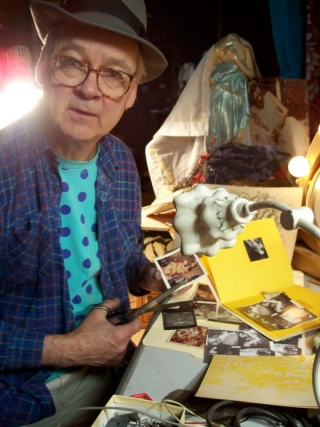Tony Conrad investigated the conditions of video production and presentation in a series of tapes which deconstruct or re-appropriate the techniques of TV. Exploiting the reflexive nature of the medium, he critiques the electronic image and notions of history, theory and authority with an irreverent sense of humour. Postmodernism was never this much fun! The artist will introduce this programme of rarely seen works.
TONY CONRAD TAKES ON VIDEO: WHO’S WATCHING WHO ?
Friday 13 June 2008, at 7pm
London Tate Modern
CONCORD ULTIMATUM
Tony Conrad, USA, 1977, video, b/w, sound, 35 min (10 min excerpt)
In Concord Ultimatum, I bend the structuralist / materialist film idiom in the direction of narrative, by addressing the video apparatus, the camera, directly. Materialist films were structured around a frank recognition of the primacy of the cinematic apparatus, but the recognition itself of this materialism required critical assessment; that is, a hidden stage of the materialist work, virtual to the work itself, is its identification and assessment as materialist. In Concord Ultimatum I hoped to assimilate the critical stage into the work, by repositioning the conditions of representation in the virtual space of audience reception.
REDRESSING DOWN
Tony Conrad, USA, 1988, video, colour, sound, 18 min
Redressing Down uses the distance between the body and architectural / environmental space as a metaphor for the relationship between maker and viewer. It invokes the body in relation to personal living space, in that personal space constructs an essential site for mediated social activity. A series of vignettes, each of which grips the viewer in a setting of psychic expectancy, constructs a psychological and cultural ‘virtual reality’, each viewer’s feedback into the video is their own theatrical construction of the tape’s events.
IPSO FACTO
Tony Conrad, USA, 1985, video, colour, sound, 7 min
A story of technology, appropriation, and authority. High technology is a palisade of errors behind which artists are marionettes of industry or addicts of solitaire. Inappropriate appropriation abounds here – inappropriate because what’s quoted is either not an entry in the cultural ark(ive) or is vulnerable to criticism. Then there’s the completely untrustable face, a pasty puffy morning after case, an old futz that nobody would ever believe, who mouths quotes from Mussolini (an authority no one can take seriously, the most maligned and possibly least acceptable thinker of the century), and who looks out from his monitor upon an old-fashion audience that listens unblinkingly, without a peep or guffaw.
LOOKERS
Tony Conrad, USA, 1984, video, colour, sound, 4 min (pilot segment)
An analytical crisis ensues when the viewer’s activity is accounted within the work: without a (historic) closure, there can be no criteria of quality, nor a universal reference for judgement. Postmodern discourse has at least made a down payment on this cost to theory. Lookers seeks a different answer by moving against the tide; it explores the inclusion of discipline itself within the realm of interactions which encompass the work and viewer. In this fragment, there is a stress on the visual perceptual mode. Other footage expands Lookers into other sensory modalities, and implements a more alluring discipline.
EGYPT 2025
Tony Conrad, USA, 1986, video, colour, sound, 13 min (work in progress)
The First Intermediate Period was the occasion for a remarkable constellation of innovations in Egyptian thought and civil order. After the death of Pepy the First, none of the numerous claimants to his sacred throne was able to reverse the dire drought that announced the modern incursions of the Sahara into Egypt; one after another they were secretly denounced and executed; and simultaneously Egypt was visited by refugees filtering in across the eastern and western sands. Local nobles were unopposed in their power, and they attained to the same privileges as pharaoh in the afterworld (‘the West’). For the first time men and women too won rights of private ownership, of contracted marriages, and (with a proper burial) of entry to the West. Remarkably, individuals began reflecting in writing on the world around them, and the first introspective literature was invented. Egypt 2025 immerses itself in this concatenation of catastrophes, which is elaborated across the mixed space of family, gender, writing, law, civil order, religion, personal identity, and death. Any historical complex is simultaneously an invocation of our own condition, the conviction that sustains ’history’ as narrative arises amid the multiplication of overdetermining details that compose its ‘authenticity’.
NO EUROPE
Tony Conrad, USA, 1990, video, colour, sound, 13 min
Science fiction can invent a ‘future’ in a way that historical romances are not permitted to do. No Europe violates this convention, freely projecting a past in which the ‘white man’ (and woman) in America was not from Europe at all, but instead has somehow derivatived from a primitive cave-dwelling condition to which ‘Caucasians’ would have been weirdly ill adapted, since they would have received no assistance, as the historical Europeans did, from Indians – a people whom we are led to understand may instead have been living in Europe. Needless to say, this script is rife with rudeness and inconsistency.
ACCORDION
Tony Conrad, USA, 1981, video, colour, sound, 5 min
Around 1958 or 1959 Henry Flynt and I did a public performance of a Duo by Christian Wolff on two violins. Henry was an able performer; I, on the other hand, was not. My tone was shrill and thin, without the warmth of vibrato or the nuanced bowing that comes with long practice. Nevertheless, the ‘lesson’ of John Cage’s music was the equivalence of all sounds, and for me the successful testing of this notion against the amateurism of my own practice was a fascinating confirmation of my forwardness in ‘going public’ as a musician. Henry informed me that in fact Christian particularly liked the qualities of our performance. This attitude, which in effect accepted (or even found substantial interest in) amateurism in musical performance, was significant for me in releasing my self-assurance as a performer. From this point forward I was comfortable with, and even preferential toward, amateurism in performance. In 1980, I made Accordion, a video performance that caricatured inept performance as a heroic enterprise.
IN LINE
Tony Conrad, USA, 1986, video, colour, sound, 7 min
A trisection of the spectator’s power over their own image language: word, trance, and command are installed as valences of the artist’s license; revealed as figures of parental authority. How peculiar that people like being an audience because they enjoy their submission to the authority of the program. This ritual of being dominated is a conspiracy with themselves that we enjoy but refuse to acknowledge. “Oh, no. I don’t like TV because I’m submissive; it’s because it makes me feel good.” The programs are always carefully crafted to be sensitive to people’s self-protectiveness, even if they offer a good scare, or a good cry. Well, if this is all true, what happens when, by chance, you submit to a program that refuses to be polite about your closet masochism? That … tells all? In the wake of Combat Status Go, and in the course of making the trilogy “The Poetics of TV” (which comprises Ipso Facto, An Immense Majority and In Line), I discovered that meta-narrative devices could be employed ironically – even perniciously. Even an ‘advanced’ viewer might not have a chance to enjoy full independence from the strictures of the work, but they would enjoy the demonstration of their encumbrance by older viewing habits (or one might say the deconstruction of narrative conceits), to the extent that they found themselves trapped by the unravelling devices of these three short tapes.
All texts or quotes by Tony Conrad.
Back to top
